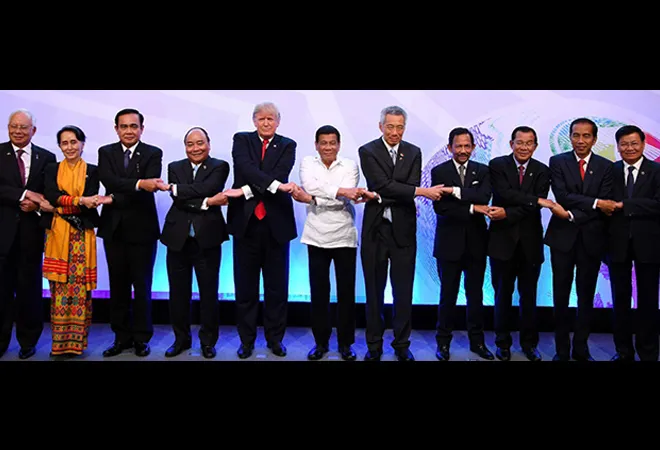
How Donald Trump has changed the world series>
If the Indo-Pacific is indeed the theatre of the ‘new great game’, then Southeast and East Asia are at the heart of it. Gloomy forewarnings regarding a perceived lack of trust in the US as a Pacific power, coupled with apparently inconsistent economic policies of Washington amongst countries in the region, have been closely followed by calls for an Asia Pivot 2.0 by Joe Biden, should he win the presidency. The reality is different, though. From a geopolitical standpoint, the Trump administration has contributed constructively to the policy approaches geared towards the preservation of regional stability and the encouragement of alliances.
This has, in turn, emboldened the positions of countries in the region which had previously been reticent and equivocal. For example, despite reservations of some countries in the region, ASEAN’s adoption of its Outlook on the Indo-Pacific in 2019 confirms the organisation’s intent to assume a more robust position regarding the aggressive and overbearing actions of China. The US position on maritime claims in the South China Sea released in July, and other policy documents on strategic requirements in the region, have been more clearly and strongly-worded than past ones constructed in ambiguous legalese. An important aspect that will continue to mark US involvement in Southeast Asia is its engagement with the ASEAN, which would rightly want to maintain its centrality in the region and not allow it to be hijacked by external forces.
In East Asia, Japan and South Korea continue to be the linchpins of the US’ North-East Asia policy. To be sure, Japan and the US’ bilateral relations have flourished in recent years, as the two countries find themselves with shared geopolitical interests. The US reaffirmed its commitment to the 1960 US-Japan Treaty of Mutual Cooperation and Security and enhanced its ambit to include the Senkaku islands, on which Japan has a dispute with China. At the same time, Trump succeeded in his demands for access to the Japanese agriculture market. This would offset the forfeited benefits promised by the Trans-Pacific Partnership (TPP) trade deal from which the US has withdrawn.
The Korean peninsula, meanwhile, has been a difficult template. There are trade issues between Washington and Seoul, and Trump’s efforts at reining in North Korea’s nuclear programme failed.
While some countries would prefer to stay clear of the competition of might between the US and China, it is also clear that apprehensions regarding Beijing offset such concerns and could instead make them lean more on the US and/or US-led coalitions to balance against the weight of China. For instance, Vietnam and Indonesia, two major middle powers, together with South Korea and New Zealand have expressed their interest in joining a Quad-Plus framework. A Pew Research Centre Survey earlier this year showed a greater degree of favourability for the US in comparison to China across countries in the region. COVID-19, too, has caused a reassessment of manufacturing hubs and supply chains; in the near future, this would put the spotlight on Southeast Asian nations as potential alternatives to established networks.
At its core, the overarching question in this part of the world is one of safeguarding a rules-based order as opposed to allowing interventionist forces to gain ground. The next US administration will be tested on the nature of the world order that will follow from this contest.
The views expressed above belong to the author(s). ORF research and analyses now available on Telegram! Click here to access our curated content — blogs, longforms and interviews.




 PREV
PREV



